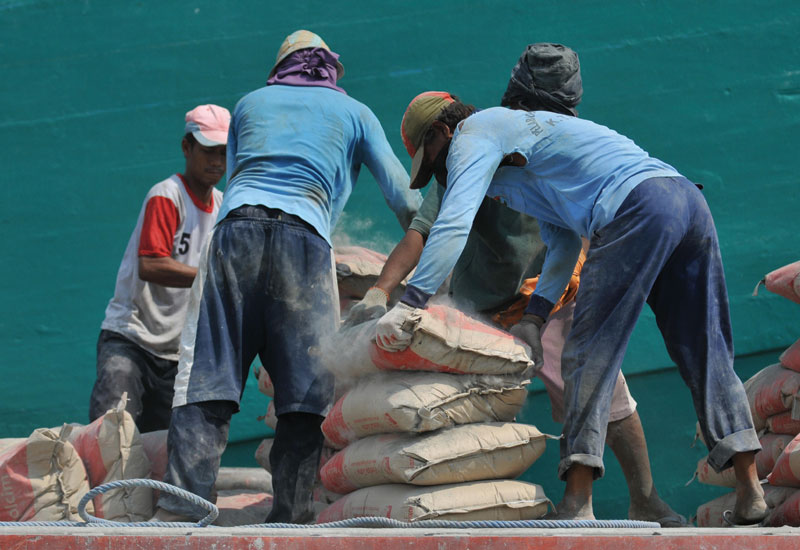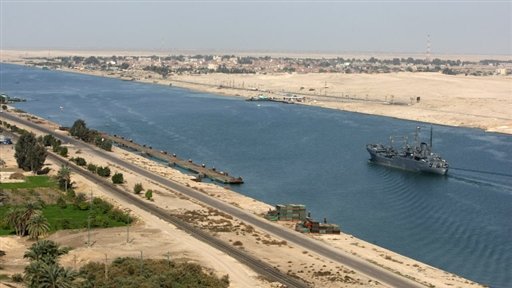
(AFP Photo)
By Sahar al-Zarqani
Cement companies rejected proposals put forth by the Ministries for Environmental Affairs and Local Development to use waste as a source of fuel within factories. Such companies further rejected claims that they sought to postpone the introduction of coal as an alternative source of fuel to natural gas and mazut, stating that they first needed to obtain permission from the Ministry of State for Environmental Affairs in order to do so, a process which they hoped to complete as quickly as possible.
Faruq Mustafa, managing director for Misr Beni Suef cement company, stated that implementing a programme that would employ waste as an alternative source of fuel would take time, pointing to the need to first conduct studies on the project’s feasibility, in addition to passing legal and environmental legislation to regulate its use.
Such a programme would require that factory furnaces be converted in order to accommodate the waste, a process which would prove costly to companies. He further added that total energy gains from implementing such a system would only be 15% of that which was required to operate factories.
He added that the focus of the Ministry of State for Environmental Affairs on implementing a new waste fuel programme would divert energies away from the utilisation of coal, whose use should be a top priority. Coal, he said, would provide companies with increased amounts of available energy, which in turn would help address problems faced by factories that have shut down as a result of shortages seen in natural gas supplies.
Many factories have experienced increased production costs totaling upwards of 20%, as a result of fuel shortages, the need to re-active previously shut down production lines, in addition to continuing to pay the salaries of non-productive employees in order to prevent mass layoffs.
He added that the Ministry of State for Environmental Affair’s postponement of the approval of the use of coal as a source of fuel has led a number of factories to cut back their production rates, which in turn has led to lower rates of sales. This will cause companies he said to take in fewer profits and suffer serious losses.
Mustafa added that Misr Beni Suef cement company was currently suffering from a 50% decline in production capacity, as a result of production lines being shut down due to shortages seen in natural gas supplies. He said the company was using mazut as an alternative source of energy, but that despite the availability of the latter, the country’s energy crisis had reached its peak. He stated that the company had recently sent a letter to the Minister of Petroleum calling for a swift solution to the country’s energy crisis, in addition to pushing for the Ministry of State for Environmental Affairs to speed up its approval of the use of coal as an alternative source of energy.
Mahmoud Mukhaimr Salim, Chairman of the Cement Division within the Alexandria Chamber of Commerce, stated the Ministry of State for Environmental Affairs should allow for the use of coal within factories before efforts are made to employ waste as a source of fuel. He pointed to recent decreases in the price of coal, in addition to its widespread availability on the domestic market compared to that of waste. He also added that coal could be easily imported in the case that it was not available domestically.
In the case that waste was used as a source of fuel, studies would need to be conducted on waste samples in order to determine whether or not they possessed any traces of heavy metals. Companies would also need to obtain approval from various government administrative agencies regarding the terms and conditions put forth in order to trade, transport and store dangerous waste, with companies needing to keep codified lists of all their clients, in addition to the type of waste being used and its amount. The Ministry of State for Environmental Affairs would further put out a quarterly report on the state of such waste, cataloguing the types and amounts being used, in addition to statistics regarding emissions produced. For these reasons, Salim stated that coal would be a preferable alternative, seeing as its use would be easier to regulate, in addition to the fact that it would produce larger returns on available amounts of energy.
Mohamed Hussein, Director of Investor Relations for the Alexandria Cement company, stated that the use of waste as an alternative source of fuel would only increase the total amount of available energy on the domestic market by 10%. He further pointed out that total production costs would increase if waste was to be employed as a source of fuel, as furnaces would need to be converted in order to accommodate the waste, in addition to the need to conduct studies and tests on waste samples.
Hussein stated that he feared that issues related to energy shortages would be forgotten or overlooked and that approval of the use of coal would not be provided quick enough by the necessary government agencies. This would cause a number of factories being shut down he said, which in turn would lead to large numbers of employees being laid off from work. Some factories he stated had already cut back on the number of shifts being provided to employees.
Many factories have cut back on their use of natural gas due to the fact that many of the country’s ports were unequipped to handle its import, in addition to recent increases seen in the price of the dollar. He stated that additional sources of natural gas needed to be made available on the domestic market, keeping in mind that cement factories consume half a million cubic meters of gas per day.
Increases in the price of natural gas have led to increased production costs for many companies, who have found themselves cutting back on exports due to their inability to compete on the world market.
Adel Labib, Minister of Local Development, recently held a meeting last week, attended by the Minister of State for Environmental Affairs, and the Governors of the Cairo and Giza, to discuss ways to improve sanitation in the two provinces and benefit from the availability of waste as a means of providing fuel to factories.



